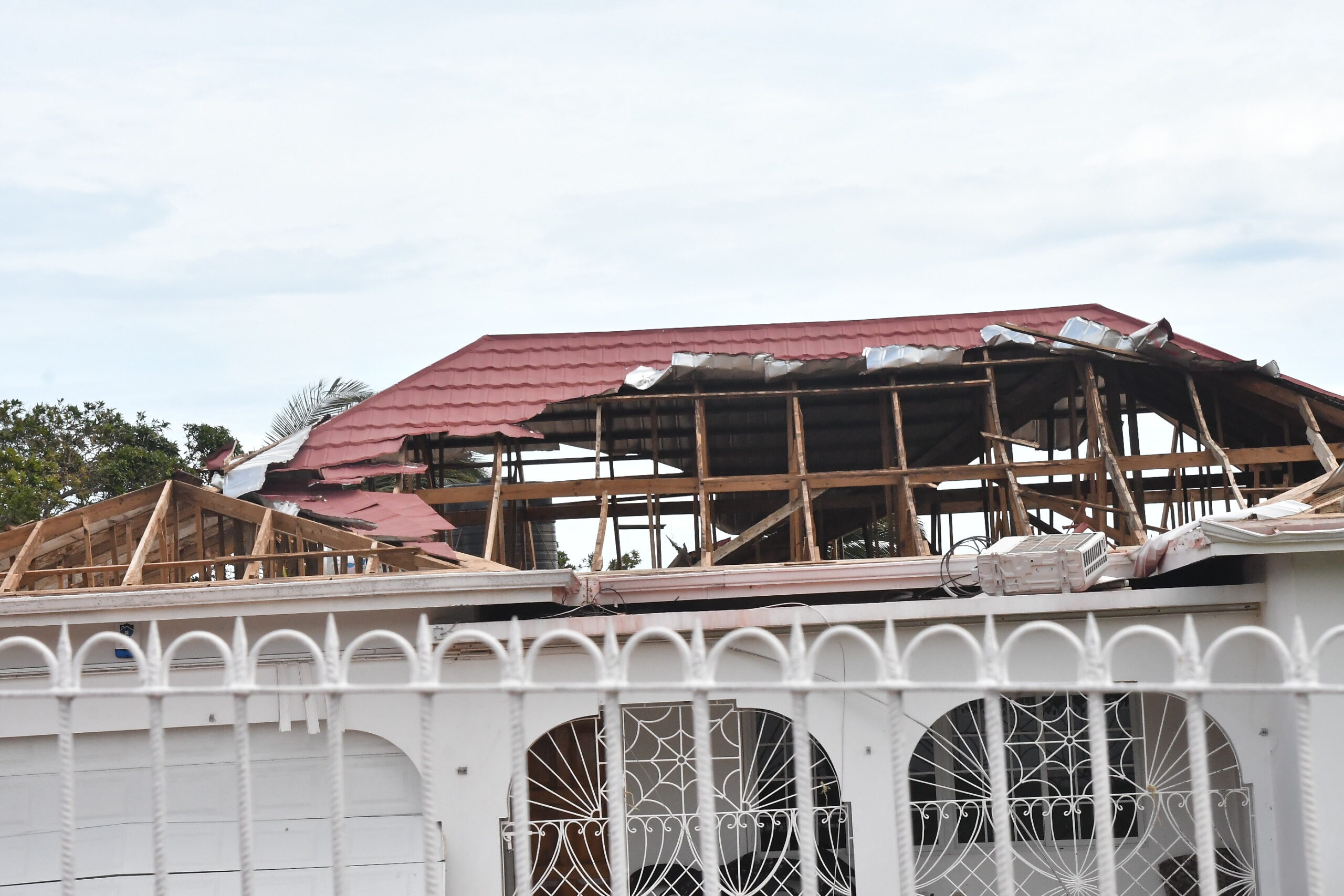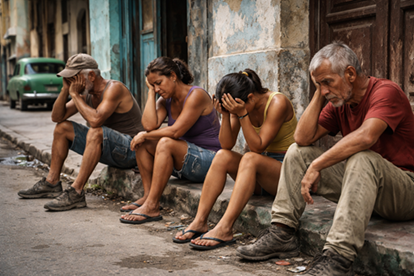
By Alex Scott
Hurricane Melissa made landfall in Jamaica and it has etched its way into our history. Tales of surviving hurricanes Gilbert and Charlie, both of which were major life-altering storms, seem like child’s play when compared to this hurricane and its impact.
At the time of writing, at least 32 people have been confirmed dead. The grim number is set to rise as more bodies are found in the wreckage and people die from hurricane-related things such as lack of insulin, diabetes medication and so on. The true death toll of this hurricane, like many natural disasters, will unfortunately never truly be known, but we do know it is a lot. My heart goes out to those who have lost loved ones to this storm and its aftermath.
The storm will also live on for the level of property damage it has caused and the economic impact it will invariably have. Black River, the St Elizabeth capital, looks like a war zone and alone will take tens of billions of dollars to just be restored to its former self, which we now know was woefully underprepared for such an event. Parts of Westmorland. Hanover, St James, St Ann, and Trelawny also look as if bombs went off, with the property damage looking like it is going to be in the billions just to get back to square one.
While the catastrophe bond will pay out money that will be used to rebuild, if we are honest with ourselves, it will be a drop in the ocean. Roads, which got fixed in programmes worth millions of USD are now not even fit for donkeys. Waterworks, which again cost millions to install and upgrade, have been washed away and otherwise destroyed. Schools, which were undergoing upgrades and which have state-of-the-art equipment have been levelled, with campuses and equipment gone with the wind. Homes, some of which have been occupied for generations, are gone, rendering hundreds of thousands of people homeless overnight.
This does not even mention the agricultural sector, which had only just begun to rebound following the passage of Hurricane Beryl last year. Farmers, who had to start again last year and were looking forward to this year to at least take some of the Beryl pressure off, have to start over, this time, not one step behind, but two or three steps. Produce and meat will rise in prices, and the increase will remain for a good while as farmers look to get back on something like solid ground, but this will have a trickle-down effect of impacting the consumer who is already crying out at the cost of living.
Then there is tourism, which whatever one thinks of it as an industry, is labelled the backbone of our economy. This hurricane couldn’t have hit at a more inopportune time as the winter tourism season begins next month. It’s not just that hotels have been damaged, the big ones will be fixed; a special hell, however, awaits the small and medium enterprises that were destroyed, as they will have a hard time recovering.
The real issue is a crass marketing one; the images people now associate with Jamaica will not be palm trees and scantily clad people, but wreckage and carnage. That will turn people off, make them think twice about visiting and will see the industry pump millions of USD (which could be used for other things) into just retaining their existing market share and not the rapid expansion which the minister recently touted.
This is going to have long-term impacts, and they will be felt immediately. Talks of wage increases have gone out the window, talks of expanding the economy are ended, the hype about full employment is going to be over.
Whatever one thought about our macroeconomic stability or what we did to achieve it, we did what no other country has done to date in our debt-to-GDP reduction. It was a nearly 20-year effort which, strangely for Jamaica, had continuity and buy-in across administrations. Public sector workers in particular suffered; those who rely on State agencies and facilities bore the brunt, but we did it, it was something regardless of how we felt we achieved it, and it was a collective effort.
All that is gone up in smoke through no fault of our own; it was not JLP or PNP which did this; it was not of our making; this was global warming. We didn’t spend nearly two centuries polluting the environment, and it is not us who currently deny the reality of global warming and its impacts. But it is we — Haiti, Cuba, Solomon Islands, Naru and other former colonies (the third world) — who live with the impacts. It is our development which is retarded, it is our progress which is set back, and it is our economies which are destroyed as a result of past and current actions of a selfish global minority — the global north — who believe the world is their plaything.
The Government must be commended for how they have handled this disaster. Their communication has been top-notch, and agencies have not shied away from answering questions about the situation as events unfold. The almost immediate fight against misinformation, scammers, and other groups that would use our trauma for their gain is also good to see. We have seen too many cases, particularly in Haiti, where relief organizations, even reputable ones like the Red Cross, use the situation to enrich themselves and engage in rampant corruption.
The money and other aid must be watched like a hawk, and groups which purport to be charitable organizations, or ones with good intentions must be thoroughly scrutinized before deciding on them. Now is not the time to allow any and everyone in, even in our sorry state, as quite a few snake oil salesmen will be appearing, promising to do things, whether it is providing aid or rebuilding infrastructure, and they must be avoided for the sake of our recovery efforts.
The State has a mammoth task on its hands; it must rebuild and do it in a way that not only provides immediate relief for those most harshly impacted but also in a manner which is not viewed as partisan or with political intentions. Based on recent history and our macro-economic stability, we know that the country can tackle these Herculean efforts. The real questions are if the running dogs for the major parties will sit quietly and allow the relief efforts to play out; and if the Government won’t use this as an opportunity for good old patronage in constituencies held by them, and the political cleansing of communities not held by them.
With the epicentre of the hurricane’s damage being in St Elizabeth and Westmorland — JLP and PNP strongholds — the Government has to walk a tightrope in not making it look partisan, and the Opposition has to bite its tongue, as the areas which are more damaged are given priority.
Experiencing this hurricane has opened Jamaica to an international audience in ways we have not seen before. German, Belgian, Spanish, French, US, Canadian, British, Chinese, and Qatari news stations carried reports on the hurricane, tracking its passage and eventual landfall and impact. One constant thread ran through the majority of the reports coming from these agencies, and it was the trauma and poverty porn. The hyping up of the potential impacts, the frequent showing of the shanty communities as if we all live there, and the talk of our woeful inability to survive this kind of storm, especially in comparison to the global north, were all on full display in most media reports on this.
Thankfully, this was called out not only on social media but by people in real life I have spoken to, and by our local reporters, commentators and speaking heads. This, though, should act as the slap in the face, the wake up call that, as far as the global north is concerned, we are nothing more than an English-speaking Haiti. A poor black country, yes, with the sunshine and rum, but still primitive and at the mercy of the environment. Savages who kill each other for no reason and with no external prompting. We should take note of this, and instead of fighting our black and brown brothers should be uniting to fight against what is obviously a common enemy.
This could be seen in its rawest form with Fox, for example, but the Guardian and others, too long to list, also engaged in this type of reporting. This should tell us that we are not viewed as equals, not as friends, not as partners, we are dependents at best and a novelty at worst. Something to be gawked at and prodded, looked at with wonder, and then put away, really, when you think about it, we haven’t come that far from the days of the human zoo, with the camera lens now replacing the cage which housed the “exhibit”.
The international media has also been caught telling a few untruths as well, notably called out by Daryl Vaz. Talk about lack of access to the county if some roads become inaccessible, talk about people being unable to travel at all because of the precarity of NMIA (an airport and area which I know has been constantly retrofitted to survive massive storms) were all called out by locals as lies. Talk of the majority living in zinc shanties was also called out, because while a lot of us do, it is by no means the majority.
This ties in with the disaster porn and voyeurism for third world suffering, but I hope it also leaves a lasting mark with us in another way. If they are lying about this, what else are they lying about? Could it be that the global north media pushes an agenda, maybe for views, but also a political one? Are the same people who lied to us about this, and we know where they lied, telling the truth about Venezuela? Are these proven liars honest actors when it comes to Cuba? Can they be trusted when they talk about Chinese debt traps when they have shown they can’t be trusted with this?
I am by no means saying all they do is engage in lies and salacious news to bump up views; they also engage in some good journalism, but that is obviously so few and far between that it is like finding a gold nugget while panning, a cause for celebration.
The storm is over, work is to be done to bring us back to a state of normalcy, especially out West, but in this we cannot forget the human element. People will need to be rehoused, even if it is temporarily, and people will need supplies. Now more than ever, we need to reignite the spirit of community and voluntarism in the country. It is good to see the people doing their best to get relief aid to the West, but this must not be a temporary thing. We must be doing this for as long as necessary, the impacts will be long-term, and we must even look to expand it to other areas when things have calmed down.
It is our country, we live here, and with the consequences of things we do and in this case haven’t done. We must take ownership for now and the long term; we must strengthen the sense of community among us, the idea that I can call on my neighbour for assistance, if we are to go forward.



